|
|
|
Sort Order |
|
|
|
Items / Page
|
|
|
|
|
|
|
| Srl | Item |
| 1 |
ID:
136137


|
|
|
|
|
| Summary/Abstract |
The democratic evaluative tradition has sought to change evaluation practice towards approaches and techniques that generate diverse forms of knowledge and foster public deliberation over a programme's merit and worth. This paper locates one evaluation method, ‘Most Significant Change’ (MSC), within this tradition. Drawing on two different evaluations – one, of a comprehensive economic sector assistance package to the Government of Tokelau, and the other of a psychosocial and academic support intervention for pre-adolescent children in conflict-affected regions of the Gaza Strip – the paper provides evidence of how MSC can capture unexpected outcomes, act as a tool for real-time formative learning, and expose the competing theories, logics and values behind programme activity. The examples within the paper also provide evidence of how MSC begins to redistribute traditional power relationships in assessing the merit and worth of observed impacts by increasing the legitimacy of local programme knowledge, and engaging all parties in evaluative decisions. By doing so, MSC, the paper argues, better serves the purposes of learning, improvement and mutual accountability which should sit at the core of good development practice.
|
|
|
|
|
|
|
|
|
|
|
|
|
|
|
|
| 2 |
ID:
137045


|
|
|
|
|
| Summary/Abstract |
This article examines the performance of the European Union (EU) in the International Atomic Energy Agency (IAEA). Following Barnett and Finnemore, the article argues that the EU as an intergovernmental organization (IO) possesses bureaucratic power based on high technical knowledge and rational–legal authority that it can use to gain influence in the Agency. The EU uses its technical knowledge to be a first-mover in political and technical discussions, and uses its financial support to influence the Agency's technical standards and practices for nuclear safeguards, security, and safety. Nevertheless, the analysis shows that its rational–legal authority as an international organization is limited. Being a regional IO, it does not automatically possess the impartiality and hence legitimacy that ordinarily characterize an international organization. Thus, to further improve its performance in the IAEA, the EU must look beyond internal policy issues and focus on its external legitimacy and standing as well.
|
|
|
|
|
|
|
|
|
|
|
|
|
|
|
|
| 3 |
ID:
134714


|
|
|
|
|
| Summary/Abstract |
Despite robust, and much touted, growth, Kazakhstan's economic system enjoys only tepid support among large swathes of the population and is viewed by many as neither fair nor legitimate. Extreme juxtapositions of new wealth and new poverty against a historic background of economic and social egalitarianism combine to make this a potent and combustible issue. Women, ethnic Slavs, the poor, people in urban areas most afflicted by post-Soviet de-industrialisation, those who feel they have lost out in the transition to a market economy, and those who are pessimistic about their financial prospects are more likely to question the legitimacy of the current economic system. Because scepticism about the distributive system contributes to political and social strife, these findings provide grounds for concern about Kazakhstan's long-term stability.
|
|
|
|
|
|
|
|
|
|
|
|
|
|
|
|
| 4 |
ID:
136995


|
|
|
|
|
| Summary/Abstract |
This article analyses the legitimation strategies of Chinese labour non-governmental organizations (NGOs). Given the relative newness of NGOs as an organizational form in China and the precarious space they operate in, their survival and development are not primarily a question of establishing autonomy and avoiding state control, as emphasized in the literature on Chinese associations, but rather a question of being perceived as legitimate social actors. This article conceptualizes legitimation as a form of communication in which NGOs articulate discursive elements in specific ways in order to legitimize their identity and voice. Drawing on interviews with 15 labour NGOs working with migrant workers, the article identifies three aspects of NGOs’ legitimation work. First, the NGOs construct their identity and work as social and not political in nature, thus underscoring that they are non-governmental and not anti-governmental organizations. Second, the NGOs give voice to, or represent, migrant workers and their interests by engaging in different forms of advocacy. Third, the NGOs legitimize their voice by referring to their proximity to workers at the grass roots and their specialist knowledge about migrant workers’ living and working conditions. In conclusion, the article argues that issues of power and discourse should be brought into the study of NGOs’ legitimation work.
|
|
|
|
|
|
|
|
|
|
|
|
|
|
|
|
| 5 |
ID:
134693
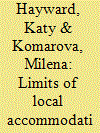

|
|
|
|
|
| Summary/Abstract |
This article examines the difficulties of finding local solutions to the problem of contentious events in contemporary Northern Ireland. In so doing, it offers a sociological perspective on fundamental divisions in Northern Ireland: between classes and between communities. It shows how its chosen case study—parades and associated protests in north Belfast—exemplifies the most fundamental problem that endures in post-Agreement Northern Ireland, namely that political authority is not derived from a common civic culture (as is the norm in Western liberal democracy) but rather that legitimacy is still founded on the basis of the culture of either one or the other community. Haugaard's reflections on authority and legitimacy are used to explore Northern Ireland's atypical experience of political conflict vis-à-vis the Western liberal democratic model. The Bourdieusian concepts of field illusio and doxa help to explain why it is that parading remains such an important political and symbolic touchstone in this society.
|
|
|
|
|
|
|
|
|
|
|
|
|
|
|
|
| 6 |
ID:
134795
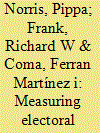

|
|
|
|
|
| Summary/Abstract |
Many contentious elections end in disputes about alleged fraud, irregularities, and malpractices. How do we know when these claims are valid and when they are false complaints from sore losers? This article describes a new dataset developed by the Electoral Integrity Project. Based on a survey of election experts, the research provides new evidence to compare how national contests around the world are meeting international standards of electoral integrity. The questionnaire includes 49 key indicators clustered into 11 stages of the electoral cycle, as well as generating an overall summary Perception of Electoral Integrity (PEI) 100-point index. The evidence displays high levels of external validity, internal validity, and legitimacy. The PEI datasets allow researchers to gauge the perceived quality of elections worldwide. This study summarizes the PEI’s research design, compares the quality of elections around the globe, and illustrates how electoral integrity is linked with both democracy and development.
|
|
|
|
|
|
|
|
|
|
|
|
|
|
|
|
| 7 |
ID:
134694


|
|
|
|
|
| Summary/Abstract |
Twenty years on from the 1994 cease-fires, Northern Ireland is a markedly safer place for children and young people to grow up. However, for a significant number, growing up in post-conflict Northern Ireland has brought with it continued risks and high levels of marginalization. Many young people growing up on the sharp edge of the transition have continued to experience troubling levels of poverty, lower educational attainment, poor standards of childhood health, and sustained exposure to risk-laden environments. Reflecting on interdisciplinary research carried out since the start of the “transition” to peace, this article emphasizes the impact that embedded structural inequalities continue to have on the social, physical, mental, and emotional well-being of many children and young people. In shining a light on the enduring legacy of the conflict, this article moves to argue that greater attention needs to be given to the ongoing socioeconomic factors that result in limited lifetime opportunities, marginalization, and sustained poverty for many young people growing up in “peacetime” Northern Ireland.
|
|
|
|
|
|
|
|
|
|
|
|
|
|
|
|
| 8 |
ID:
136798


|
|
|
|
|
| Summary/Abstract |
Despite India’s efforts to mend its ties with its South Asian neighbours, to befriend Pakistan will remain as one and only challenging task of India’s foreign policy. It is said that legitimacy of Pakistan remaining as a state thrives on anti-India rhetoric. And the people there, are in a habit of rallying behind the government in Islamabad during an India-related crisis. Therefore, to some analysts, the unilateral postponement of Secretary Level dialogue with Pakistan in August this year is regarded as a disproportionate response from India.
|
|
|
|
|
|
|
|
|
|
|
|
|
|
|
|
| 9 |
ID:
134485


|
|
|
|
|
| Summary/Abstract |
Why has Piketty's Capital become a publishing sensation? Not for revolutionary findings; its message that western societies have experienced increases in inequality of income and wealth over the long term is hardly new. Of the several reasons discussed in this article, attention is paid in particular to the book's timing and its claim to reveal the laws of income and wealth distribution in western societies. Had the book been published before 2008 it would have been much less successful. Piketty's revelation of the big trends and their underlying logic helps to objectify, legitimize and offer a kind of catharsis for surging middle-class anxieties during the Great Recession. These anxieties have been further intensified by evidence that over 90 per cent of the increase in disposable income in the United States has accrued to the top 1 per cent of the population in the past several years, and a not much lower percentage to the top 1 per cent in Britain. In the conclusion it is argued that if Piketty's forecasts are even remotely accurate, capitalism will lose its core claim to legitimacy.
|
|
|
|
|
|
|
|
|
|
|
|
|
|
|
|
| 10 |
ID:
136442
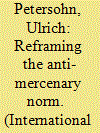

|
|
|
|
|
| Summary/Abstract |
Since the nineteenth century, the anti-mercenary norm has prohibited violent market actors from participating in combat. Today, however, private military and security companies (PMSCs) are widely perceived as legitimate. How did they achieve that legitimacy? This article argues that PMSCs initially resembled mercenaries. Previously, mercenaries were defined as fighters participating in combat for pay, be it offensive or defensive. PMSC advocates aimed to alter the combat component of the anti-mercenary norm. By arguing that PMSCs’ use of force was not combat, but rather individual self-defence, they created an alternative interpretation that established the practice as appropriate. As critical actors like the US, the United Kingdom, and the United Nations adopted their interpretation, the regulatory scope of the norm changed. In short, PMSCs are perceived to be legitimate because they are no longer implicated in the anti-mercenary norm.
|
|
|
|
|
|
|
|
|
|
|
|
|
|
|
|
| 11 |
ID:
135338


|
|
|
|
|
| Summary/Abstract |
Russian interventions in South Ossetia and Crimea indicate a major shift in Moscow's policy towards the former Soviet republics. This article compares the two interventions in terms of military performance, basis of legitimacy, and motivational goals. This confirms the formation of a new and more assertive Russian policy in the region. Although there were significant differences between the two interventions, improved Russian military capabilities reveal the Kremlin's plans to project power in the near abroad. The Russian leadership used similar legal justifications for the two interventions, based on the Kosovo precedent, opening the possibility of further military action in the former Soviet space. Notwithstanding the legal excuse, Moscow mainly intervened in Georgia and Ukraine to prevent further NATO enlargement eastwards, regain geopolitical influence regionally, and respond to perceptions of insecurity and a sense of humiliation. With the possible exception of the Baltic States, the rest of the former Soviet republics could, sooner or later, fall under Russia's sway. It is a challenge that the West can choose to confront either with tougher sanctions and more involvement in the region, or by initiating a new process of socializing Russia into the international community, with security assurances and economic incentives in return for acknowledgement of Russia's role as a great power
|
|
|
|
|
|
|
|
|
|
|
|
|
|
|
|
| 12 |
ID:
136558


|
|
|
|
|
| Summary/Abstract |
There is increasing evidence that corporate social responsibility (CSR) is emerging as a management issue within Chinese business (Moon and Shen 2010; Yin and Zhang 2012). The main drivers of this movement, which are commonly discussed, include domestic political will and international pressure. However, what is less understood is
the nature of the shaping of CSR. As a concept, CSR has been widely interpreted as the way companies take into account interests of a broader range of stakeholders beyond owners and shareholders of the firm. Hence, it is about the way firms develop policies and practices to minimize the negative impacts and even increase the positive impacts of their business practices on various stakeholder groups. In a Western context, the rationale for CSR has been explained as a result of interaction between business, government and society where institutional pressures that develop from these interactions lead to certain expectations regarding the nature of business practices. This is where firms increasingly see CSR as a strategic approach to maintaining and enhancing legitimacy and reputation so as to ensure the buy-in and loyalty of key stakeholder groups such as employees and customers.
|
|
|
|
|
|
|
|
|
|
|
|
|
|
|
|
| 13 |
ID:
136464
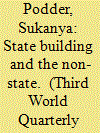

|
|
|
|
|
| Summary/Abstract |
This article unpacks the relationship between state building and the non-state. While accepting both the positive and corrosive characteristics of non-state actors and informal practices of governance, it attempts to (1) advance an argument in favour of mainstreaming ‘non-state’ forms that are positive and useful for state building; and (2) highlight the tensions between the practice of state building and the reality of the non-state. In thinking beyond the state and non-state dichotomy, the article seeks to identify factors that are necessary if state-building programmes are to work in complex environments. Drawing on received wisdom from recent experiences, this conceptual study focuses on important contextual, local, political and legitimacy issues to highlight prominent dilemmas. The conclusion suggests four policy-relevant lessons that reinforce the argument in favour of mainstreaming the non-state agenda into the critical thinking about security and development.
|
|
|
|
|
|
|
|
|
|
|
|
|
|
|
|
| 14 |
ID:
136542
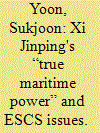

|
|
|
|
|
| Summary/Abstract |
Xi Jinping's conception of “true maritime power” is intertwined with a set of complex issues: internal factors concerning the legitimacy of Xi's regime and external factors such as territorial disputes in the East China Sea and the South China Sea (ESCSs) which concern sovereignty. The nations of the region must consider the implications of China's approach and its impact on the region: Is it possible to influence China by standing together?
|
|
|
|
|
|
|
|
|
|
|
|
|
|
|
|
|
|
|
|
|